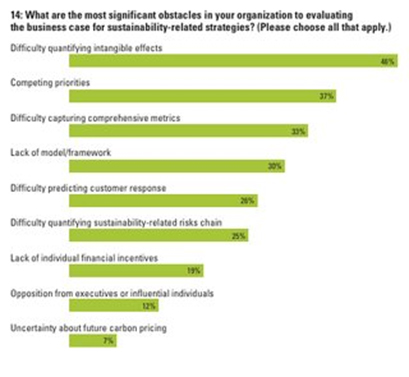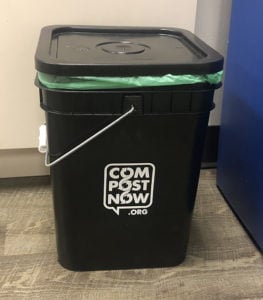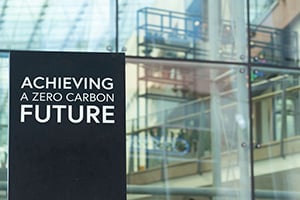 By Truc Vu
By Truc Vu
Engineering Analyst Intern
Sustainable Investment Group (SIG)
I recently went to a restaurant to catch up with a friend. Our to-go containers were made of Styrofoam, and our drinks were contained in paper cups with plastic lids and straws. Before I left, I went to the restroom only to find that the last person did not turn off the light switch. Single-use plastics, lighting without automatic shutoff; these are just a few examples of outdated practices hurting our environment. If we take into consideration all the businesses globally, the facts are daunting. Nearly 100 companies are contributing to 71% of the world’s carbon pollution.[1] While we may hear of some companies changing their business models, many are still hesitant to jump on such efforts. It is 2019…what exactly is stopping businesses from adopting sustainable practices?
The Misconception that Profit and Sustainability are Inversely Related
Many businesses believe that making changes to better the environment come with a hefty price tag, even though countless research and data prove the return on investment of sustainable practices. Boston Consulting Group and MIT’s Sloan Management Review surveyed executives and managers and found that more than two-thirds of their companies do not have performance indicators (KPI’s) to measure metrics and data related to sustainability.[2]
Below is a graph listing common obstacles holding businesses back. BCG/MIT[3]

From the graph we see that companies do not know what to implement, how to implement, and how to measure the results. Inconvenience and money are some other setbacks, and while upfront costs may look intimidating, sustainability does see profit.
Below is another chart from the same survey. BCG/MIT[3]

Respondents of the survey whose profits have increased by adopting sustainable strategies have usually also invested in new, innovative business models. The effort to stay updated with the market and the values of consumers are frameworks of all businesses, why should sustainability not be included?
How Businesses Today are Investing in the Future
Perhaps it is difficult to know where to get started when making sustainable business changes. Here is a look at what some companies are currently implementing:
 Single-use plastics/Styrofoam: Food and beverage companies are getting rid of straws, using 100% recycled napkins and to-go containers, eliminating use of Styrofoam and plastic cups, getting rid of plastic grocery bags, and simplifying their packaging. Companies like Starbucks [4], McDonalds, and Kroger have adopted some of these practices.
Single-use plastics/Styrofoam: Food and beverage companies are getting rid of straws, using 100% recycled napkins and to-go containers, eliminating use of Styrofoam and plastic cups, getting rid of plastic grocery bags, and simplifying their packaging. Companies like Starbucks [4], McDonalds, and Kroger have adopted some of these practices.
Photo credit: mashable.com.
- Energy consumption: Companies (and many homeowners) have installed LED-light bulbs and occupancy sensor lighting to save both energy and money. Facebook and Amazon have even committed to powering their facilities by 100% renewable energy.[5]
- Water reduction: Companies like Coca-Cola aim to reduce their water use by 25% through careful evaluation of their water management.[6] Hotels are purchasing energy-efficient laundry machines and giving customers the option to reuse their towels and sheets, saving water and energy. Caesars in Las Vegas saved 30 million gallons a year (about $135,000-$218,000 savings/year) by doing so.[7]
 Waste Reduction: Offices like our very own Sustainable Investment Group (SIG) have recycling and composting bins within the office, reusable coffee pods/containers, water refill stations, and reusable plates, bowls, and mugs and sinks to wash them.
Waste Reduction: Offices like our very own Sustainable Investment Group (SIG) have recycling and composting bins within the office, reusable coffee pods/containers, water refill stations, and reusable plates, bowls, and mugs and sinks to wash them.- LEED-certified workspaces: Many companies have adopted LEED certified workspaces for clean, efficient workspaces for their employees (SIG is LEED Certified Gold). LEED-certification can improve energy performance and give suggestions for buildings to save on energy costs.
- Responsible Companies like Green Mountain Coffee and Patagonia advocate for the environment and push company initiatives and suppliers to become more sustainable. Patagonia makes their clothing from recycled cotton and other natural fibers to reduce microplastic wastes in our oceans.[8]
While these practices range from major to minor, it shows that company executives are starting to make important changes. It is about time that all businesses join the bandwagon and strive for sustainability.
 If you are interested in how your business can become LEED certified, want to improve your office’s energy performance, or want cut costs in other ways, please visit our website. Sustainable Investment Group (SIG) provides Leadership in Energy & Environmental Design (LEED) Consulting, LEED Exam Prep Training, Green Building Consulting, and Technical Services from our offices in Atlanta, GA; Boulder, CO; Minneapolis, MN; New York, NY and San Francisco, CA.
If you are interested in how your business can become LEED certified, want to improve your office’s energy performance, or want cut costs in other ways, please visit our website. Sustainable Investment Group (SIG) provides Leadership in Energy & Environmental Design (LEED) Consulting, LEED Exam Prep Training, Green Building Consulting, and Technical Services from our offices in Atlanta, GA; Boulder, CO; Minneapolis, MN; New York, NY and San Francisco, CA.
Resources
- https://www.theguardian.com/sustainable-business/2017/jul/10/100-fossil-fuel-companies-investors-responsible-71-global-emissions-cdp-study-climate-change
- https://www.businessinsider.com/why-companies-fail-at-being-sustainable-2013-2
- https://www.bcg.com/publications/2013/sustainability-strategy-innovation-bottom-line.aspx
- https://mashable.com/article/starbucks-plastic-straws-cold-lids/#hy6y6QRo1iqF
- https://www.cnbc.com/2018/08/29/facebook-just-made-a-huge-commitment-on-renewable-energy.html
- https://www.coca-colacompany.com/stories/setting-a-new-goal-for-water-efficiency
- https://www.smithsonianmag.com/smart-news/reusing-hotel-towels-actually-does-make-difference-180949890/
- https://www.retaildive.com/news/patagonia-doubles-down-on-sustainability/546144/
© 2019 Sustainable Investment Group (SIG). All rights reserved.



